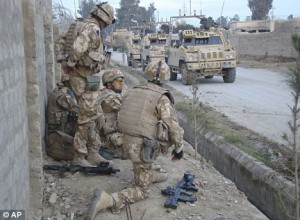Tuesday
Mar092010
Afghanistan: Getting the Real Point Of The Marja "Offensive"
 Tuesday, March 9, 2010 at 7:29
Tuesday, March 9, 2010 at 7:29  Gareth Porter has an excellent piece up on Inter Press Service, "Fiction of Marja as City Was U.S. Information War," in which he breaks down the media disinformation campaign on the size of Marja:
Gareth Porter has an excellent piece up on Inter Press Service, "Fiction of Marja as City Was U.S. Information War," in which he breaks down the media disinformation campaign on the size of Marja:Marja is not a city or even a real town, but either a few clusters of farmers' homes or a large agricultural area covering much of the southern Helmand River Valley.
"It's not urban at all," an official of the International Security Assistance Force (ISAF), who asked not to be identified, admitted to IPS Sunday. He called Marja a "rural community".
"It's a collection of village farms, with typical family compounds," said the official, adding that the homes are reasonably prosperous by Afghan standards.
Porter is right on, and you should read the whole thing for an idea on exactly how these disinformation campaigns are spread, but I'm afraid in the case of Marja, we might be missing the point. We're complaining that Marja is only an excuse for a propaganda victory while at the same time complaining that the victory won't be worth anything because it's not a city.
As Woody Allen said on a much different topic, "This food is terrible, and such small portions!"
This shouldn't be news to anyone, but Afghans live in rural communities. We're supposedly there to protect Afghans from the Taliban after all. Rajiv Chandrasekaran described the strategy last year in the Washington Post:
The U.S. strategy here is predicated on the belief that a majority of people in Helmand do not favor the Taliban, which enforces a strict brand of Islam that includes an-eye-for-an-eye justice and strict limits on personal behavior. Instead, U.S. officials believe, residents would rather have the Afghan government in control, but they have been cowed into supporting the Taliban because there was nobody to protect them.
Great, so if the plan is to protect Afghans from the Taliban, then you'll want to go where Afghans actually live, right? That would be in "a collection of village farms, with typical family compounds," just like the anonymous ISAF official told IPS.
Big cities like Kabul and Herat don't speak for the entirety of all Afghans, so focusing all of our attention on the major urban centers doesn't do anything to extend the legitimacy and credibility of the government, much less provide security from the Taliban. President Karzai's derisive nickname as the "Mayor of Kabul" was one small indicator of just how well the strategy of focusing on city centers, at the cost of conceding rural territory to the Taliban, was working. That is, not working at all. We also can't discount the effect concentrating on cities had on the Taliban propaganda narrative of western-occupied Kabul (or Islamabad) oppressing the mostly-rural Pashtuns.
In this case, Marja being a small farming community might actually be a positive step. So, ISAF finally went to the population, but are they protecting them? From Military.com:
At least 35 civilians have been killed in the operation, according to the Afghan human rights commission. Spokesman Nader Nadery said insurgent bombs killed more than 10 people, while NATO rocket fire killed at least 14.
Not only are we failing to protect the civilians from the Taliban, but we seem to have killed more Afghans than the militants themselves. Perhaps the Afghans will show their legendary patience, and accept that the government had to massacre 14 of their friends and relatives with rockets in order to have a more peaceful, prosperous Afghanistan. Will they side with Karzai? From the same article above:
"Are you against me or with me?" Karzai asked the elders. "Are you going to support me?"
The men all raised their hands and shouted: "We are with you. We support you."
But...
[Tribal Elders] complained - sometimes shouting - about corruption among former Afghan government officials. They lamented how schools in Marjah were turned into military posts by international forces. They said shops were looted during the offensive, and alleged that innocent civilians were detained by international forces.
But they still said they said they support Karzai, right?
Mohammad Naeem Khan, in his early 30s, said his loyalty is to whoever will provide for him.
"If the Taliban tap me on the shoulder, I will be with them, and if the government taps me on my shoulder I will be with them," Khan said.
So we wind up with the exact same bloody stalemate we've had since about 2002. They'll side with the government, except for when they side with the Taliban. That's not a victory, propaganda or otherwise.
The problem is not the size of Marja, it could be a teeming industrial metropolis of millions, it still wouldn't matter as long as we continue using military force and propping up a corrupt, illegitimate government. Until we have a strategy that doesn't involve violently imposing our pet gangsters' will on the Afghan people, we'll have a hard time even distinguishing ourselves from the Taliban, much less convincing the citizens to take our side against them.
Had enough? Become a fan of the Rethink Afghanistan campaign on Facebook and join our fight to bring the Afghanistan war to an end.
Josh Mull is the Afghanistan Blogging Fellow for The Seminal and Brave New Foundation. You can read his work on The Seminal or at Rethink Afghanistan.

